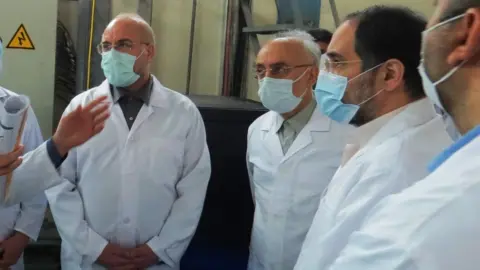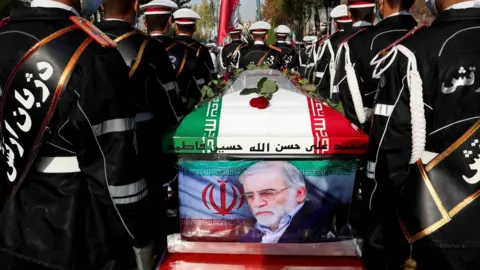Iran produces uranium metal in new violation of nuclear deal
Iran has started producing uranium metal, despite being warned by world powers that it constitutes another breach of the 2015 nuclear deal.
International Atomic Energy Agency inspectors verified the existence of 3.6g (0.1oz) of the substance at a facility in Isfahan last week.
Iran says it is carrying out research and development with the aim of producing fuel for a research reactor.
But uranium metal could also be used to make the core of a nuclear bomb.
Iran insists its nuclear programme is peaceful, but it has rolled back a number of commitments under the nuclear deal over the past two years.
It says it is retaliating for the US economic sanctions that were reinstated in 2018 by then President Donald Trump when he abandoned the accord.
His successor, Joe Biden, says Iran must return to full compliance before he will lift the sanctions. However, Iran's Supreme Leader Ayatollah Ali Khamenei says the US must make the first move.
Under the accord, Iran agreed not to produce uranium metal or conduct research and development on uranium metallurgy for 15 years.
On Wednesday evening, the International Atomic Energy Agency (IAEA) said its director general had informed member states "about recent developments regarding Iran's R&D activities on uranium metal production as part of its stated aim to produce fuel for the Tehran Research Reactor".
 EPA
EPA"The agency on 8 February verified 3.6g of uranium metal at Iran's Fuel Plate Fabrication Plant (FPFP) in Isfahan," it added.
Last month, the Atomic Energy Organization of Iran (AEOI) said it had started R&D activities with the aim of producing an advanced fuel called silicide for the Tehran Research Reactor, which is devoted mainly to making radioisotopes for medical purposes.
The AEOI stressed that uranium metal had peaceful uses, and that it was not violating the global Treaty on the Non-Proliferation of Nuclear Weapons.
The UK, France and Germany - three of the five world powers still party to the nuclear deal - said they were "deeply concerned" by the announcement. "Iran has no credible civilian use for uranium metal. The production of uranium metal has potentially grave military implications," they warned.
In December, Iran's parliament passed a law requiring the government to bring the metallic uranium factory at the Isfahan Fuel Plate Fabrication Plant on line within five months.
Hardline MPs tabled the legislation following the assassination in late November of the country's top nuclear scientist, Mohsen Fakhrizadeh, which Iranian leaders blamed on Israel.
The law also says that if US sanctions are not lifted the government must step up uranium enrichment, operate advanced uranium enrichment centrifuges, stop implementing an agreement that allows inspectors to visit nuclear facilities at short notice, and build a new heavy-water reactor.
Iran has already resumed enriching uranium to 20% purity - far above the level of 3.67% permitted under the nuclear deal - and begun using a number of advanced centrifuges. Uranium with 20% purity can be used in research reactors, while weapons-grade uranium is 90% or more.
 Reuters
ReutersWhen asked about the latest Iranian breach on Wednesday, US state department spokesman Ned Price told reporters: "We continue to urge Tehran to resume full compliance with the [nuclear deal].
"We continue to do that because that, for us, would open up the pathway for diplomacy. And we certainly hope to be able to pursue that pathway of diplomacy in order to resolve what we do consider to be an urgent challenge."
Iranian Foreign Minister Mohammad Javad Zarif had earlier warned in a video that "with the new administration in Washington there is an opportunity to try a new approach, but the current window is fleeting".
"Soon my government will be compelled to take further remedial action in response to the American and European dismal failure to live up to their commitments under the nuclear deal."
